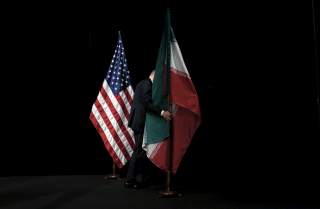50+ Retired Generals and Diplomats Urge the United States to Reenter Iran Deal
Re-entry into the nuclear deal will contribute to establishing a broader U.S. national strategy for the Middle East.
The United States should rejoin the Iran nuclear deal. The 2015 nuclear deal, known as the Joint Comprehensive Plan of Action (JCPOA), put limitations on Iran’s nuclear program that provided assurances that it would not be used to develop weapons, improved American intelligence about potential future development and significantly improved the security of the United States and our allies. Subsequent to the United States’ withdrawal from the deal, Iran’s continued compliance is not ensured and the benefits from the agreement risk being lost. Reentering the Iran nuclear deal advances the United States’ national interests by ensuring these benefits persist and enables us to work more closely with our European allies in ensuring that Iran never obtains nuclear weapons.
Reasons for re-entry:
- Iran is complying with the agreement. In a recent report, the International Atomic Energy Agency confirmed Iran’s compliance to the 2015 nuclear deal, despite the United States’ withdrawal from the deal and re-imposition of economic sanctions. Tehran’s continued adherence to the agreement demonstrates the Iranian government’s commitment to its initial pledge.
- Under the JCPOA regulations, Iran’s enterprise lacks the nuclear weapons-development activity necessary to produce a nuclear device and is subject to unprecedented international monitoring.
- Our European allies are firmly committed to the agreement. In a recent statement, the Council of the European Union expressed “resolute commitment to and continued support” for the Iran deal, which they consider “a key element of the global nuclear non-proliferation architecture and an achievement of multilateral diplomacy.”
- Re-entry into the nuclear deal will contribute to establishing a broader U.S. national strategy for the Middle East. We condemn Iran’s continued ballistic missile activities, human rights violations and support for terrorism, as they pose threats to the United States and the region. Reaffirming leadership in this area will improve the ability of the U.S. to develop and lead a multilateral effort to contain the Iranian threat.
- We must recall that the initial agreement was a strategic, long-term, high-stakes endeavor focused on one goal: preventing an Iranian nuclear weapons program. Reentering the agreement and lifting the sanctions will greatly enhance the United States’ ability to negotiate improvements and enable us to address our concerns with the existing agreement.
This statement was organized by The American College of National Security Leaders.
Rear Admiral Sandy Adams, USN (Retired)
Brigadier General Clara Adams-Ender, USA (Retired)
Brigadier General Ricardo Aponte, USAF (Retired)
Vice Admiral Don Arthur, USN (Retired)
Rear Admiral Jamie Barnett, USN (Retired)
Brigadier General Donald C. Bolduc, USA (Retired)
Ambassador Susan Burk, Retired
Brigadier General Stephen A. Cheney, USMC (Retired)
Rear Admiral Christopher Cole, USN (Retired)
Major General Peter S Cooke, USA (Retired)
Vice Admiral Dirk Debbink, USN (Retired)
Brigadier General James H. Doty Jr., USA (Retired)
Major General Paul Eaton, USA (Retired)
Major General Mari K Eder, USA (Retired)
Brigadier General Robert Felderman, USA (Retired)
Vice Admiral Michael Franken, USN (Retired)
Lieutenant General Walter Gaskin, USMC (Retired)
Rear Admiral Stephen Glass, JAGC, USN (Retired)
Ambassador Thomas Graham, Retired
Vice Admiral Kevin P. Green, USN (Retired)
Major General Richard S. Haddad, USAF (Retired)
Major General Bob Harding, USA (Retired)
Ambassador William Harrop, Retired
Brigadier General Don Harvel, USAF (Retired)
Major General Sanford E. Holman, USA (Retired)
Ambassador Richard Holwill, Retired
Ambassador Vicki Huddleston, Retired
Brigadier General David R. Irvine, USA (Retired)
Lieutenant General Arlen D. Jameson, USAF (Retired)
Lieutenant General Claudia Kennedy, USA (Retired)
Ambassador Laura Kennedy, Retired
Ambassador Patrick Kennedy, Retired
Ambassador Jimmy Kolker, Retired
Ambassador Daniel Kurtzer, Retired
Major General Dennis Laich, USA (Retired)
Major General Steven J. Lepper, USAF (Retired)
Major General Randy Manner, USA (Retired)
Ambassador Edward Marks, Retired
Brigadier General Carlos E. Martinez, USAF (Retired)
Brigadier General J. Scott O'Meara, USMC (Retired)
Rear Admiral David Oliver, USN (Retired)
Major General Gale S. Pollock, USA(Retired)
Rear Admiral Harold Robinson, USN (Retired)
Brigadier General John M. Schuster, USA (Retired)
Rear Admiral Michael E. Smith, USN (Retired)
Brigadier General Paul Gregory Smith, USA (Retired)
Brigadier General Francis X. Taylor, USAF (Retired)
Ambassador Edward Walker, Retired
Lieutenant General Willie Williams, USMC (Retired)
Major General Margaret C. Wilmoth, USA (Retired)
General Johnnie Wilson, USA (Retired)
Brigadier General Stephen N. Xenakis, M.D., USA (Retired)
Major General David T. Zabecki, USA (Retired)

